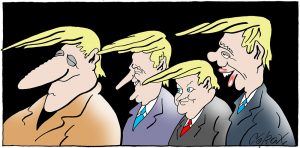An interview with Aleksandra Nenadović, Voice of America, 9 November 2016 Drawn by Corax for the Serbian daily Danas
Drawn by Corax for the Serbian daily Danas
What does the electoral victory of Donald Trump mean for US foreign policy in the Balkans? Any prediction is fraught with high uncertainties because no one knows the extent to which Trump’s populist demagoguery from the electoral campaign will become official US policy.
However, many observers concur that American foreign policy will be more inward-looking and realist. The realist notion of a balance of power would resonate with the ideas of Russia as a great power and a new Jalta-order shared by Russia’s current political leadership. A balance-of-power orientation would imply conceding zones of influence to other great powers and deemphasizing concerns for universalist ideas such as democracy or political freedoms.
A more realist and inward-focused US government will probably refrain from a further enlargement of NATO in the Balkans, mainly to avoid taking additional international commitments and increasing the costs for joint defence. Moreover, such a presidential administration would be less intrinsically committed to promoting multinational state projects such as Bosnia, Kosovo and Macedonia. Russian policymakers would perceive such policy stances as converging with Russia’s interests in the region. This could open windows of opportunity for local separatist/ irredentist mobilization.
Download the VOA analysis (in Serbian):voa_161109